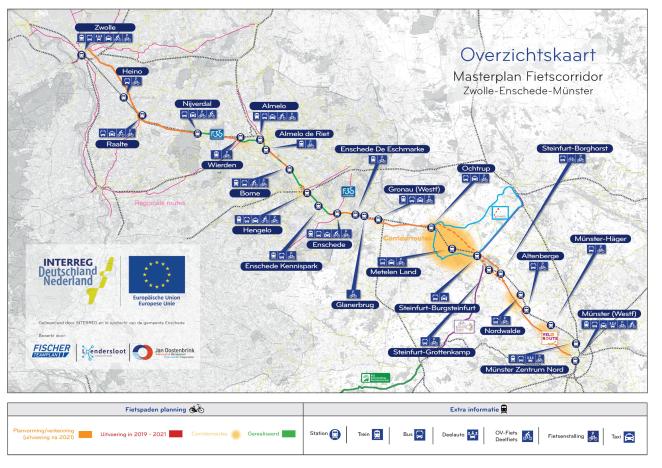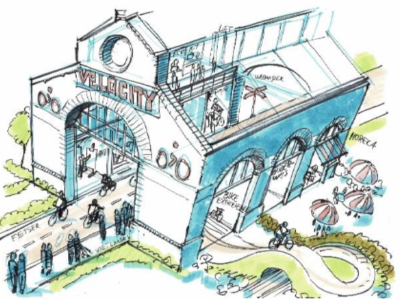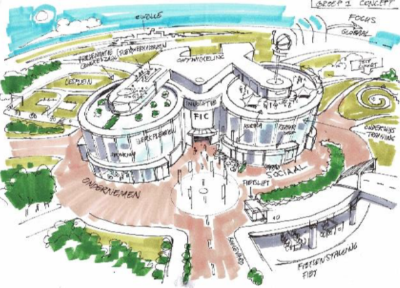
Figure 1: Map of Cycling Highway
Province of Overijssel
The Province of Overijssel’s large cycling infrastructure network has its foundations on 3 pillars: infrastructure, behaviour, and smart cycling. Through a collaborative effort with its 25 municipalities, it has played a pivotal role in preserving, expanding, and improving approximately 4,800 kilometres of cycling paths.
Cycle highways, such as the noteworthy F35 from Zwolle to Enschede, serve as crucial channel for commuting between municipalities and take centre stage as the focal point for the flagship initiative in the Province of Overijssel and the Cities of Enschede and Zwolle
Through the flagship pilots mentioned below the Province of Overijssel aims to achieve three goals: Increase cycling by 20-30%, encourage greater number of cycling for short-distance trips and lastly, elevate the overall percentage of cycling in the modal split, surpassing the figures for both public transport and automobiles.
Cycling App
The initial pilot aimed at promoting cycling within specific target groups involves the creation of a mobile app, drawing inspiration from the existing Enschede-fietst app. This app will integrate with intelligent solutions like Schwung to grant priority to cyclists at signalled intersections.
The goal is to engage the entire population of Overijssel, nevertheless the primary target group will be on students and commuters. This is a significant shift from the current scenario, where no cycling-promoting app exists, highlighting its innovative nature.
Smart Traffic Lights
Through the MegaBITS project the Province of Overijssel will also speed-up the deployment of Smart Traffic Lights on the smart cycling corridor F35.
This initiative holds significance as the smart traffic lights will enhance the understanding of bike traffic patterns, offering improved and diverse options for traffic flow regulation and increased options to prioritize cycling and will be done though several cloud-applications.
Multimodality
The Province of Overijssel also aims to improve connectivity between various modes of transport along the F35 smart cycling corridor. This effort to enhance multimodality aims to facilitate a seamless transition from cycling to public transportation. The focus of this initiative lies in providing cyclists with information regarding bike parking availability and the departure times of trains or buses.
This marks a groundbreaking move, as it will mark the first time a cycling corridor in the province of Overijssel is actively promoting intramodality between cycling and public transport through smart solutions. This significant advancement will serve as the foundation for future work as well as filling the current gap in connectivity between the F35 and the surrounding transportation infrastructure.
City of Zwolle
The City of Zwolle is the capital of the province of Overijssel and stands as the second-largest municipality in the province, following Enschede.
Through its involvement in MegaBITS and the implementation of flagship initiatives, one of its key aims is to achieve a 20% increase in cycling by the year 2027. Additionally, the city is committed to enhancing cycling safety and strengthening the cycling infrastructure committee. These goals are central to the upcoming pilots outlined below.
Digital Twin
The city of Zwolle already has a Digital Twin, function as a virtual replica on the ESRI platform. The choice of platform(s) is contingent upon specific requirements and objectives for each use case.
The existing digital twin is more than just a passive visualization of the city, as it incorporates information and intelligence for analyses and simulations. The current version, inclusive of data on buildings, green spaces, and more, will be enriched with information from the MegaBITS implementation and newly generated data through analyses.
This tool will empower city planners, as it will allow to perform scenario simulations, helping create better cycling infrastructure to promote sustainable transportation. Crucially, the tool's improvement serves as a catalyst for elevating the quality and harmonization of existing data, fostering collaboration among diverse disciplines and partners.
More visualization options and data extraction from the digital twin will allow for effective communication with residents and partners. Such communication will allow policymakers to make more informed decisions, which enhances the appeal of cycling and fosters greater interest and participation in cycling activities.
Smart Lighting
The second pilot involves the introduction of dynamic lighting to illuminate currently unlit routes. This is particularly crucial in areas where the absence of a power supply or ecological considerations take precedence. The implementation of dynamic lighting aims to enhance the safety, social security, and appeal of these routes during dark hours.
Consequently, more individuals will have the opportunity to cycle in various locations along the F340 cycling highway between Zwolle and Enschede, where the dynamic lighting will be installed.
Counting Poles
The third flagship project involves the installation of cycling counting poles to gather and display permanent (bicycle) data and information for users of the regional bicycle route. This can include data on the number of cyclists, speed, details about Public Transport connections, weather forecasts, and other relevant information.
As of now, there are no bicycle counting poles in the Zwolle territory along the F340. The implementation of these poles will enable the collection of data that can be utilized by policymakers to formulate more targeted legislation related to cycling.
Bicycle Innovation Centre
The final project, deemed the most innovative, involves establishing an Innovation Centre where entrepreneurs, education researchers, and government entities collaborate on pioneering bicycle technologies. Ongoing discussions with interested companies aim to determine the optimal utilization of the Bicycle Innovation Centre. There is also consideration for a pop-up Innovation Centre until a permanent facility is warranted, contingent on a substantial interest from companies looking to relocate.
However, the ultimate aspiration is to create a physical Bicycle Innovation Centre, where diverse innovative entities collaborate. This Centre serves as a hub for generating ideas that contribute to enhancing the safety, convenience, speed, and comfort of cycling. Additionally, the location functions as a gathering spot for cyclists and serves as a showcase for cycling in Zwolle and the surrounding region.
City of Enschede
Enschede, situated in the eastern part of the Province of Overijssel near Germany is known for its rich history as well as its thriving education and technology sectors, with the University of Twente contributing to its academic excellence.
The city aspires to achieve specific targets by 2026, including a rise in short trip bike usage from 43% to 50%, an increase in medium trip bike usage from 19% to 30%, heightened cyclist satisfaction rating at a minimum of 8 out of 10, and a 33% reduction in cycling accidents compared to 2019. To realize these goals, Enschede has introduced four flagship projects within the MegaBITS initiative.
Prioritizing specific groups
The objective of this pilot is to improve service quality for people with mobility impairments. This will be realised through a connection between the ‘Enschede Fiets’ app and traffic lights, to give longer green times to special groups. The national Dutch standards for communication will be used. Currently, this service is only available for pedestrians using a button. Enschede will add cyclists to this service and transfer the feature to an app in order to prevent misuse. This will take away barriers for mobility impaired people, thus encouraging them to cycle more.
App campaign
This pilot aims at stimulating the use of the (new) F35 cycle highway. The campaign will set-up reward action(s) for cyclist using the Enschede Fietst app. Currently, reward actions are mostly related to gathering points in the app. With this app campaign the City of Enschede aims at cooperation with local shop owners to give tangible rewards to cyclists. The target group consists of the public, university students and employees of the Kennispark businesses area.
Counting Poles
To gain a better understanding of cyclists' behaviour Enschede plans to install Counting Poles along the section of the F35 Cycling Highway within its boundaries. This initiative aims to offer real-time visibility into cyclist numbers, encouraging a culture of cycling by instantly gratifying users who pass over the counter lane. The accumulated data will serve as a valuable resource for policymakers, helping them in channelling investments more effectively toward cycling infrastructure.
Dashboarding
The fourth pilot involves optimizing the current Enschede cycling app. This will require building upon and refining its current features to effectively utilize available data, enabling prioritization of specific user groups.
The measurements of this data, including dashboard insights and rider ratings, will provide the City of Enschede information about citizens’ cycling experiences along specific routes. This will allow the city to prioritize and understand which cycling routes need to be refurbished and further inspires more citizens to embrace cycling as the infrastructure continues to evolve as their suggestions are being considered.

Figure 2: Conceptual Depiction of the potential appearance of the Innovatie Centrum

Figure 3: Conceptual Depiction of the Potential appearance of the Innovatie Centrum